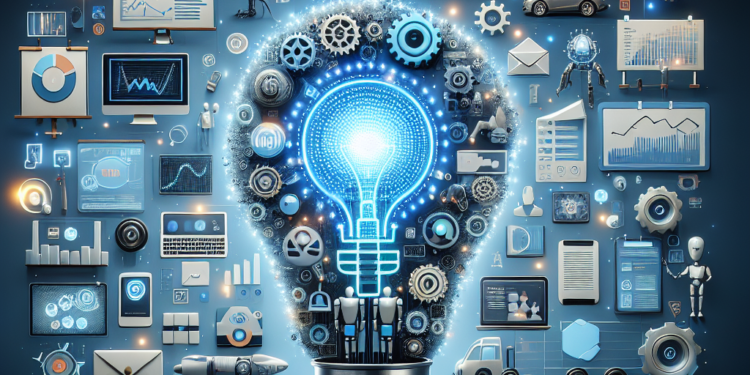Personalized Marketing Strategies Using AI
In today’s rapidly evolving business landscape, companies are constantly seeking ways to increase their competitiveness and market share. One of the key areas where businesses are focusing their efforts is in the realm of personalized marketing. Personalized marketing is a strategy that utilizes customer data and insights to tailor messaging and promotions to individual consumers. This approach has proven to be highly effective in driving customer engagement and conversion rates.
With the rise of artificial intelligence (AI) technologies, personalized marketing has taken on a whole new level of sophistication. AI tools can sift through massive amounts of customer data in real-time, allowing marketers to deliver highly targeted and relevant messages to their audience. In this article, we will explore how businesses are leveraging AI to implement personalized marketing strategies that drive results.
1. Understanding Customer Behavior
The first step in creating effective personalized marketing campaigns is gaining a deep understanding of customer behavior. AI tools can help businesses analyze vast amounts of data from sources such as social media, email interactions, website visits, and purchase history to identify patterns and preferences. By identifying these patterns, businesses can create targeted messaging that resonates with individual customers.
For example, an AI-powered platform can analyze a customer’s previous purchases to recommend products that they are likely to be interested in. This not only increases the chances of a sale but also enhances the customer’s overall experience with the brand.
2. Segmenting Customer Data
Once businesses have a clear understanding of customer behavior, they can use AI tools to segment their customer data into more specific groups. By creating customer segments based on factors such as demographics, interests, and purchase history, businesses can tailor their marketing campaigns to each group’s preferences and needs.
For instance, an e-commerce retailer may use AI to segment their customers into groups such as frequent buyers, occasional buyers, and first-time buyers. By tailoring promotions and messaging to each group, the retailer can maximize the effectiveness of their marketing efforts.
3. Predictive Analytics
Predictive analytics is another key component of personalized marketing strategies using AI. By analyzing past data and trends, businesses can predict future customer behavior and anticipate their needs. This allows businesses to proactively reach out to customers with personalized offers and recommendations before they even realize they need them.
For example, a travel agency may use predictive analytics to identify customers who are likely to book a vacation based on their previous travel history and online searches. By targeting these customers with personalized promotions, the travel agency can increase the likelihood of converting them into bookings.
4. Dynamic Content Personalization
AI-powered tools can also help businesses personalize their content in real-time based on customer interactions and preferences. By using algorithms that analyze customer behavior and feedback, businesses can dynamically adjust content such as website banners, email campaigns, and social media ads to better resonate with individual customers.
For instance, an online retailer may use dynamic content personalization to showcase products that a customer has shown interest in during previous visits to their website. By showing relevant products at the right time, the retailer can increase the chances of a purchase.
5. Omnichannel Marketing
In today’s interconnected world, consumers interact with brands across multiple channels, from social media to email to in-store experiences. By leveraging AI-powered omnichannel marketing strategies, businesses can create a seamless and consistent customer experience across all touchpoints.
For example, a retail brand may use AI to track a customer’s online interactions with their website and social media channels. Based on this data, the brand can send personalized email offers and recommendations that align with the customer’s interests. This cohesive approach not only enhances the customer’s experience but also increases the chances of conversion.
6. A/B Testing and Optimization
AI tools can help businesses test and optimize their personalized marketing campaigns in real-time. By running A/B tests on different messaging and creative elements, businesses can quickly identify which strategies are most effective at driving engagement and conversions.
For example, a software company may use AI to test different subject lines in their email campaigns to see which one generates the highest open rates. By analyzing the results of these tests in real-time, the company can optimize their campaigns for maximum impact.
7. Customer Retention and Loyalty
Personalized marketing strategies using AI can also be highly effective in retaining existing customers and fostering loyalty. By analyzing customer data and behavior, businesses can identify at-risk customers and proactively reach out to them with personalized offers and incentives to keep them engaged.
For example, a subscription-based service may use AI to identify customers who have not used their platform in a while. By sending these customers personalized promotions or discounts, the service can encourage them to re-engage with the platform and potentially renew their subscription.
8. Real-Time Personalization
Finally, AI enables businesses to deliver personalized marketing messages in real-time, allowing them to stay relevant and responsive to customer needs. By using algorithms that analyze customer behavior as it happens, businesses can tailor their messaging and promotions on the fly to maximize their impact.
For example, a retail brand may use AI to send personalized push notifications to customers who are browsing their website. By offering a discount on a product that the customer has shown interest in, the brand can increase the chances of a purchase in that moment.
In conclusion, personalized marketing strategies using AI have the power to transform the way businesses interact with their customers. By leveraging AI-powered tools to understand customer behavior, segment data, and personalize content across channels, businesses can create highly targeted and effective marketing campaigns that drive engagement and conversions. As AI continues to evolve, the possibilities for personalized marketing are endless, and businesses that embrace these technologies will have a competitive edge in the market.













